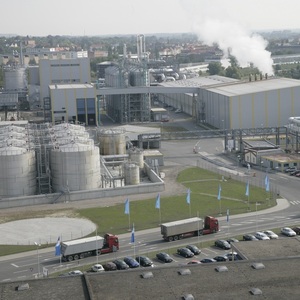CropEnergies reports increased ethanol production

CropEnergies AG
May 19, 2015
BY Erin Krueger
European Ethanol producer CropEnergies AG has released financial results for the fiscal year ended Feb. 28, reporting that ethanol production increased 20 percent last year, reaching 1.06 million cubic meters, up from 884,000 cubic meters the prior year.
In a letter to shareholders, Marten Keil, chief operating officer of CropEnergies, and Joachim Lutz, chief financial officer of the company, called 2014-’15 the most difficult year in the history of the CropEnergies Group. “The company’s development and achievements made contrast sharply with the economic key figures,” they said. “We have further optimized our production facilities, increased production volumes and forged ahead with the expansion of the business. And yet developments in the relevant markets resulted in a loss for the year.”
Advertisement
Advertisement
According to the Keil and Lutz, the political discussion over biofuels and a decrease in the consumption of petro fuels caused European ethanol demand to fall by 10 percent over the past two years, creating pressure on prices. They also note that the surprisingly sharp decline in oil prices and non-transparent price determination for ethanol have increased that pressure. In January, the price of ethanol fell to an all-time low of €417 ($464.99) per cubic meter, which had a negative impact on the earnings of European ethanol producers.
While CropEnergies achieved a 6 percent increase in revenue, reaching €827 million, the company reported an €11 million operating loss. The company also indicated its earnings were negatively impacted by one-off expenses of €$37 million caused by the temporary closure of the Ensus ethanol plant in Wilton, U.K. In February, CropEnergies announced its plan to idle the facility due to low oil prices, low ethanol prices, and other factors. At that time, the company said its other plants in Germany, Belgium and France were running at high capacity despite difficult market conditions. Together, CropEnergies plants have a combined capacity of approximately 1.2 million cubic meters. According to CropEnergies, the Ensus plant will restart operations if there is a sustained improvement in market conditions.
Keil and Lutz said at the present time, the company does not expect to see any significant changes in market conditions during the 2015-’16 financial year. As a result, production levels for the current year are expected to be similar to those reported in 2012-’13. “Although revenues will decline as a result, the risk profile of our business activities will improve,” said Keil and Lutz. “We expect to be able to generate EBITDA sufficient for covering the upcoming investments and securing the company’s capital base in this difficult market phase. At this moment in time, we cannot rule out the possibility of another operating loss.”
Advertisement
Advertisement
CropEnergies also noted that while ethanol prices have risen significantly over the past few weeks, they remain volatile, which makes the outlook for the 2015-’16 financial year difficult. However, the company also stressed that the European Parliament’s recent agreement on a compromise for the amendment of the Renewable Energies Directive is an important step forward and end the uncertainty that has lasted since 2012. A reliable framework for the European biofuels market is expected to help expand the European ethanol market in the medium term and promote the further distribution of E10. CropEnergies said revenue and earnings for ethanol producers in Europe should also improve in the medium term.
For the 2014-’15 fiscal year, CropEnergies reported revenues of €827 million, up from €780 million the previous year. EBITDA declined, reaching €25.2 million, down from €68.5 million in fiscal year 2013-’14. The company reported an operating loss of €11.2 million, compared to an operating profit of €35 million the previous year. A net loss of €28 million was reported, compared to net earnings of €12 million in 2013-’14.
Related Stories
Marathon Petroleum Corp. on Aug. 5 released second quarter financial results, reporting improved EBITDA for its renewable diesel segment. The company primarily attributed the improvement to increased utilization and higher margins.
Chevron Corp. on Aug. 1 confirmed the company started production at the Geismar renewable diesel plant in Louisiana during the second quarter after completing work to expand plant capacity from 7,000 to 22,000 barrels per day.
California’s new specified source feedstock attestation requirement: A critical new compliance step for renewable fuel producers
As of July 2025, California’s SCFS requires renewable fuel producers using specified source feedstocks to secure attestation letters reaching back to the point of origin. This marks a significant shift in compliance expectations.
The public comment period on the U.S. EPA’s proposed rule to set 2026 and 2027 RFS RVOs and revise RFS regulations closed Aug. 8. Biofuel groups have largely expressed support for the proposal but also outlined several ways to improve the rulemaking.
The U.S. renewable fuels industry on Aug. 8 celebrated the 20th anniversary of the Renewable Fuel Standard. Federal lawmakers also marked the occasion with resolutions introduced in the House and Senate earlier this month.
Upcoming Events










